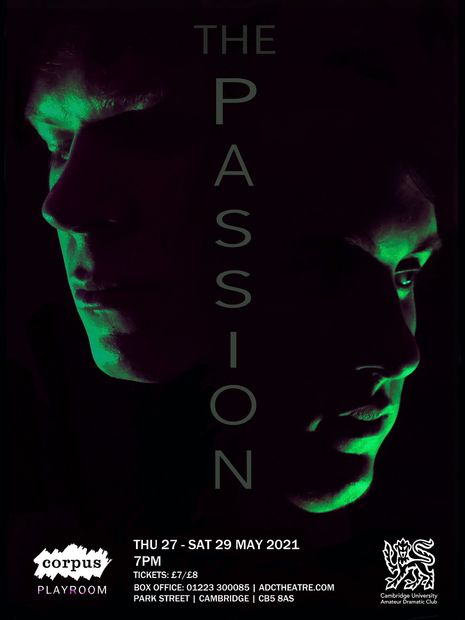‘The Passion’ is powerful exploration of ugly truths
Jasmine Regan Feldman reviews the new student written play ‘The Passion’

Content Note: This review contains discussion of sexual assault
On the 28th of May, I took a seat in the intimate Corpus Playroom Theatre. I was early, so I saw the place quietly fill with students. As people filed past the square corner stage and sat around me, they chatted, and the noise gently swelled. Old connections made anew, and introductions between soon-to-be acquaintances - it was good to be back in a theatre again.
The Passion is set over one afternoon in Cambridge student Tony's flat at the start of the academic year. Dan, his ex-boyfriend from last year, arrives to reconcile with Tony. The Passion confronts some challenging themes of sexual assault and the impact of British class dynamics. Directed by Cassia Thakkar, the play feels like watching through Tony's flat window, utilising realism to place the play's themes in an uncomfortably close context. The play captures the aesthetic, humour, and dialogue of life at Cambridge very well, hence why exposing the darker undercurrents is even more poignant.
“The intimate setting of The Passion feels as though the audience is privy to Tony's private life, and he cannot hide behind his curated persona any longer”
The acting from both performers was excellent, being equally as engaging as serious as they discussed the complicated issues that arose throughout the play. Saul Barrett as Tony was uncannily resemblant of too many Cambridge men - arrogant, dismissive, and entitled. The way Barrett sauntered across the stage and flicked his fluffy hair captured the rich Cambridge man almost too well. Barrett's portrayal exposes all the Tony's of Cambridge and all that he represents. Zac Copeland-Greene, as Dan made it clear that he was a force to be reckoned with despite what you initially may think. Dan initially presented as timid and squirming during the first act, in direct opposition to Tony's easy lounging. However, over the course of acts, Dan gains confidence in his truth, and Copeland-Greene's performance excellently portrayed his arc throughout the play.
The simple setting worked well with the Corpus Playroom space. I always enjoy a performance on the Playroom's corner stage as the unique set provides an ideal space for the most intimate of plays. A few mismatched chairs filled the stage, bottles of wine and undone dishes littered the backdrop. When Tony and Dan first sit opposite each other in reconciliation, the third chair feels like the barrier between them, where all the unsaid words sit, waiting. As the story unfolds, the characters move across the stage, sometimes in opposition, other times confronting each other in the centre, but always the third chair remains. The intimate setting of The Passion feels as though the audience is privy to Tony's private life, and he cannot hide behind his curated persona any longer.
The Passion was an original piece of student writing by Ethan Hemmati that is straightforward in its setting, but powerful in its ideas. I'll admit I am slightly biased towards these sorts of stories, one set and one time focusing on the dialogue between characters, but The Passion is merely an excellent example. Hemmati has a talent for capturing the poignancy in realism by exposing his character's facades. The shift in the power dynamics over the three acts was well executed and demonstrated the strength of Dan as his emotions were eventually legitimised. In the beginning, Tony, with his wealth and power, clearly has the upper hand in their relationship. But after Dan confronts him, the interplay shifts throughout the second act. Finally, in the third act, we see Dan's confidence regained, and it is Tony who flounders at his feet. Hemmati tackles the theme of sexual assault head-on, forcing the audience into an unwittingly uncomfortable voyeuristic position to witness how painful these consequences can be.
Overall, The Passion is a sickening exposé on power dynamics within relationships and the consequences they bring, with Hemmati highlighting that class can underpin the subconscious power dynamics in relationships. The excellent acting and intimate setting add to the skilful writing that drives the performance. The Passion pushes the audience to confront the painful truths masked by the glimmer of Cambridge life.
 News / Report suggests Cambridge the hardest place to get a first in the country23 January 2026
News / Report suggests Cambridge the hardest place to get a first in the country23 January 2026 News / Students condemn ‘insidious’ Israel trip23 January 2026
News / Students condemn ‘insidious’ Israel trip23 January 2026 News / Cambridge ranks in the top ten for every subject area in 202623 January 2026
News / Cambridge ranks in the top ten for every subject area in 202623 January 2026 News / Uni denounced for bypassing ‘democratic structures’23 January 2026
News / Uni denounced for bypassing ‘democratic structures’23 January 2026 Comment / Cambridge has already become complacent on class23 January 2026
Comment / Cambridge has already become complacent on class23 January 2026









